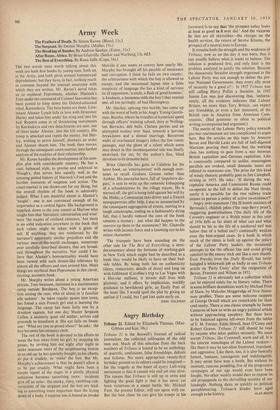Angry Birthday
Tribune 21. Edited by Elizabeth Thomas. (Mac-
Gibbon and Kee, 18s.) •
Tribune 21 is the Boswell's Journal of radical journalism, the collected soliloquies of the odd men out. Much of this selection from the back numbers of Tribune is bound to be an anthology of quarrels, confusions, false friendships, defeats and failures. No more appropriate twenty-first birthday present to its editors could be imagined— for the tragedy at the heart of eyery Left-wing movement is that it cannot win and yet stay alive. The reason that Tribune is still up in arms and fighting the good fight is that it has never yet been victorious in a major battle. Mr. Michael Foot, the present Editor, will not agree with me. But the best cheer he can give his troops in his foreword is to say that 'the prospect today looks at least as good as it ever did.' And the victories he lists are all skirmishes—the charges on the health services, the return of Seretse Khama, the prospect of a neutral zone in Europe.
It remains both the strength and the weakness of Tribune, now as on the day it was born, that it can usually believe what it wants to believe. The solution is produced first, and only later is the problem analysed to justify the solution. Because the democratic Socialist strength organised in the Labour Party was not enough to defeat the pre- war National Government, then every ally must of necessity be a good ally. In 1937 Tribune was still calling Harry Pollitt a Socialist. In 1947 Jennie Lee was just discovering that, 'unfortu- nately, all the evidence indicates that Labour Britain, no more than Tory Britain, can expect any friendship, or even a fair statement, of the British case in America from American Com- munists.' (Bad grammar so often in political writing accompanies bad argument.)
The merits of the Labour Party policy towards pre-war rearmament are too complicated to argue here. But the articles on this topic by Aneurin Bevan and Harold Laski are full of half-digested Marxism proving their thesis that the working class has nothing to gain from a war between British 'capitalism and German capitalism. Like is continually compared to unlike, meaningless parallels are evoked, small domestic issues are inflated to enormous size. The prize for this kind of windy rhetoric probably goes to Jim Campbell, writing in 1955. He asks : 'If during the war, capitalist America and Communist Russia could co-operate to the full to defeat the Nazi threat, surely it is possible for the two railway trade unions to pursue a policy of active co-existence?'
Angry over-statement (the H-bomb maniacs of Bermuda'), childish jokes ('the rasp-Berry press'), staggering generalisations ('the daily life of the Coventry engineer or a Welsh miner in this year of 1956 falls as far short of what can and what should be his as the life of a medkeval serf was below that of a belted earl') continually weaken even the best-argued cases. In a book in which much of the steam is built up against the policy of the Labour Party leaders, the occasional attempts to toe 'the official line and avoid giving comfort to the enemy stick out like a sore thumb. Even Pravda, even the Daily Herald, has never bungled a whitewash job as badly as one Tribune article on 'Party Unity' after the resignation of Bevan, Freeman and Wilson in 1951.
Tribune 21 is obviously not a collection which can be enjoyed solely for its literary value. There is some brilliant demolition work by Michael Foot of Shaw, by Malcolm Muggeridge of New States- man profiles. There are some welcome snippets of George Orwell which are remarkable for their cool sanity. There is one classic example by James Cameron of how to write an angry political article without approaching apoplexy. But these have to be balanced against left-overs from the tables of E. M. Forster, Edith Sitwell, Sean O'Casey and Robert Graves. Tribune 21 still should be read by anyone who takes politics seriously. We must accept Tribune, like Cromwell, warts and all. It is the interior monologue of the Labour rankers— like them it may be too often frustrated, impatient, and aggressive. Like them, too, it is also basically honest, humane, courageous and indefatigable. It may never have won a battle. But without its insistent, raucous prodding, few of the progressive campaigns of our age would even have been fought. No other weekly would dare to expose its old propaganda to the shrivelling scrutiny of our hindsight. Nothing dates so quickly as political pamphleteering. Tribune's tirades have aged










































 Previous page
Previous page